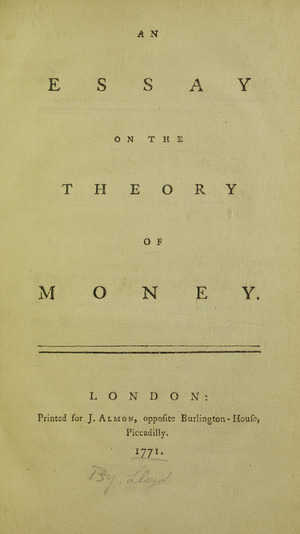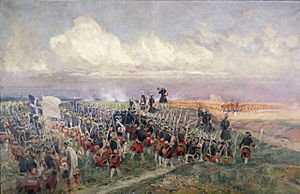Henry Lloyd (soldier) facts for kids
Henry Humphrey Evans Lloyd (born around 1718 – died June 19, 1783) was a Welsh army officer and a famous military writer. He fought for many different countries during his life. He served the French against the Austrians, and then the Jacobite forces (who supported Charles Stuart) against the British. Later, he fought for the Austrians against the Prussians, and then for the Prussians against the Austrians in the same war! He also fought for the Russians against the Turks. Besides fighting, he also worked on secret missions for Britain. His books about military strategies were studied by important leaders like George Washington and George S. Patton. His ideas even helped shape how people thought about the "science of war."
Contents
Early Life and Military Start
Henry Lloyd was the son of a clergyman. He was likely born in Llanbedr, Merioneth, Wales, but some records say he was born in Wrexham. He went to Jesus College, Oxford around 1740. After college, he wanted to join the army, but he couldn't afford to buy a position as an officer.
So, Lloyd found other ways to start his military career. In 1744, he traveled to France, hoping to become an officer there. When that didn't work out, he spent a year at a Jesuit college. There, he taught officers about geography and how to build defenses in the field.
Adventures in Many Armies
In 1745, Lloyd joined the French army. He went with them to invade the Austrian Netherlands during a big war called the War of the Austrian Succession. He became an officer in the French engineering team. This happened after his drawings from the battle of Fontenoy caught the eye of the French commander.
As a captain, Lloyd then joined the Jacobite expedition in 1745–46. This group supported the "Young Pretender" (Charles Stuart) in Scotland. Lloyd left the army to deliver messages to rebels in Wales. After that, he secretly mapped the south coast of England, pretending to be a clergyman. He was arrested as a suspected spy but was soon released.
Lloyd returned to France and fought for the French army as a major in 1747. He then served in the Prussian army before going back to French service in 1754. He even went back to England, disguised as a merchant, to map the coast again for a possible French landing. In 1756, he met with a friend and claimed he was getting money from the British government for secret work. Lloyd was never officially a British army officer, but he might have been working for them in secret.
Later, he joined the Austrian army as a lieutenant-colonel. He worked as a quartermaster during the early parts of the Seven Years' War. In 1760, after being promoted to major-general, Lloyd switched sides again and joined the Prussian army. In 1763, he tried to join the Portuguese forces, but the conflict ended before he could get a job there.
Later Life and Important Writings
After his many military adventures, Lloyd returned to England. He spent his time writing and doing other important tasks. He was involved in talks for the marriage of King George III and Queen Charlotte.
In 1768, Lloyd went on a secret mission for Britain in Italy. He helped organize supplies for the defense of Corsica. In 1773, he led a Russian army division fighting against Turkey in the Russo-Turkish War (1768–1774). He was especially noted for his bravery at the Siege of Silistra. He also fought for Russia against Sweden. He left the Russian army after not receiving a special award he felt he deserved. After traveling to places like Italy, Spain, and Gibraltar, Lloyd passed away in The Hague in 1783.
His Books and Their Impact
Henry Lloyd published Capt. Lloyd's Lists in 1760, which had information about European armies. But his other books, about military strategy, had a much bigger and longer-lasting impact.
In 1766, he published The history of the late war in Germany. For the second edition in 1781, he added Reflections on the principles of the art of war. This became his most important book. It was translated into German and French many times. A second volume was added after he died, put together from his notes. Because of these writings, some people call Lloyd "the father of the principles of modern warfare." He wrote about how to organize armies and plan battles, even using math. He was influenced by French military ideas and also by the Age of Enlightenment, which believed that human behavior could be understood using logic.
In 1770, he wrote An Essay on the English Constitution. In 1771, he wrote An Essay on the Theory of Money. In 1779, he wrote A Rhapsody of the Present System of French Politics. This book was about ways to stop a French invasion of Britain. After he died, it's said that British agents took secret papers from his house. His family was even paid not to print the book again. But it was republished in 1794 and 1798 when people were worried about a French invasion again. George Washington had a copy of this book in his own library and read it often.
Lloyd's ideas influenced many military leaders. For example, the British strategist J. F. C. Fuller studied Lloyd's work, especially after seeing the trench warfare of the First World War. During the Second World War, the American general George S. Patton had a well-worn copy of Lloyd's History in his library. He even had it repaired after a fire damaged it in 1925. Patton marked the book's spine with an "R" for "Read," showing how much he valued it.
Images for kids
 | Charles R. Drew |
 | Benjamin Banneker |
 | Jane C. Wright |
 | Roger Arliner Young |





